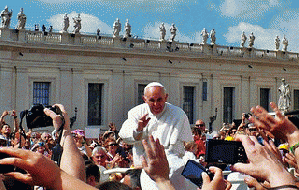
At a weekly audience, recently elected Pope Francis greets the enthusiastic crowd in St Peters Piazza. May 8, 2013
(Image by JeffFran) Details DMCA
Readings for Easter Sunday: ACTS 10: 34A, 37-43; PS 118 1-2, 16-17, 22-23, COL 3L 1-4; JN 20: 1-9.
On this Easter Sunday, it's appropriate to address the reality of Jesus' resurrection. Did he really rise from the dead? Or is that doctrine simply a remnant of childhood like belief in the Easter Bunny or Santa Claus? And for those of us concerned with social justice, what can the Bible's resurrection stories possibly mean?
This reflection tries to address those questions.
In response to the one about the factuality of Jesus' resurrection, let's look at what the Christian tradition itself tells us. It indicates that the resurrection accounts are not based on the physical resuscitation of a corpse. The experiences portrayed in tradition were more visionary and likely metaphorical.
As for the socio-political meaning of Jesus' rising from the dead, Pope Francis addresses that question quite meaningfully in his Apostolic Exhortation, Evangelii Gaudium . Life is stronger than death, he reminds us. Despite appearances, vital forces will always triumph in the end. But we'll get to that presently.
First however consider the nature of the resurrection traditions themselves. They were inspired by women and emerged from the bleakest depths of despair not unlike what many progressives might be feeling today as our fondest hopes appear further than ever from fulfillment -- as a rogue U.S. empire wreaks havoc and its savage economy destroys the planet.
Think about it.
Following Jesus' death, his disciples returned to business as usual -- fishing most prominently. It was their darkest hour. Yeshua, the one on whom they had pinned their hopes for the liberation of Israel from Roman domination was dead. Their world had ended.
But then unexpectedly, women among them reported an experience which effectively raised Jesus back to life (MT 28:1-10; MK 16: 1-8; LK 24:1-11). He was more intensely present, they said, than before his execution. Their tales changed everything.
But what was the exact nature of the resurrection? Did it involve a resuscitated corpse? Or was it something more spiritual, visionary and prophetic?
In Paul (the only 1st person report we have -- written around 50 C.E.) the experience of resurrection is clearly visionary. Paul sees a light and hears a voice, but for him there is no embodiment of the risen Jesus. When Paul reports his experience (I COR 15: 3-8) he equates his vision with the resurrection manifestations to others claiming to have encountered the risen Christ. Paul writes "Last of all, as to one untimely born, he appeared also to me." In fact, even though Paul never met the historical Jesus, he claims that he too is an "apostle" specifically because he shared the same resurrection experience as the companions of Jesus who were known by that name. This implies that at best the other resurrection appearances might also be accurately described as visionary rather than as physical.
The earliest Gospel account of a "resurrection" is found in Mark, Ch. 16. There a "young man" (not an angel) announces Jesus' resurrection to a group of women (!) who had come to Jesus' tomb to anoint his body (16: 5-8). But there is no encounter with the risen Jesus. In fact, Mark's account actually ends without any narrations of resurrection appearances at all. (According to virtually all scholarly analysis, the "appearances" found in chapter 16 were added by a later editor.)
In Mark's original ending, the women are told by the young man to go back to Jerusalem and tell Peter and the others. But they fail to do so, because of their great fear (16: 8). This means that in Mark not only are there no resurrection appearances, but the resurrection itself goes un-proclaimed. This in turn indicates either that Mark didn't know about such appearances or did not think them important enough to include!
Resurrection appearances make their own appearance in Matthew (writing about 80) and in Luke (about 85) with increasing detail. But always there is some initial difficulty in recognizing Jesus. For instance Matthew 28: 11-20 says, "Now the eleven disciples went to Galilee, to the mountain to which Jesus had directed them. And when they saw him they worshipped him; but some doubted." So the disciples saw Jesus, but not everyone present was sure they did. In Luke 24: 13-53, two disciples walk seven miles with the risen Jesus without recognizing him until the three break bread together.
Even in John's gospel (published about 90) Mary Magdalene (the woman with the most intimate relationship to Jesus) thinks she's talking to a gardener when the risen Jesus appears to her (20: 11-18). In the same gospel, the apostle Thomas does not recognize the risen Jesus until he touches the wounds on Jesus' body (JN 26-29). When Jesus appears to disciples at the Sea of Tiberius, they at first think he is a fishing kibitzer giving them instructions about where to find the most fish (JN 21: 4-8).
(Note: You can view every article as one long page if you sign up as an Advocate Member, or higher).





